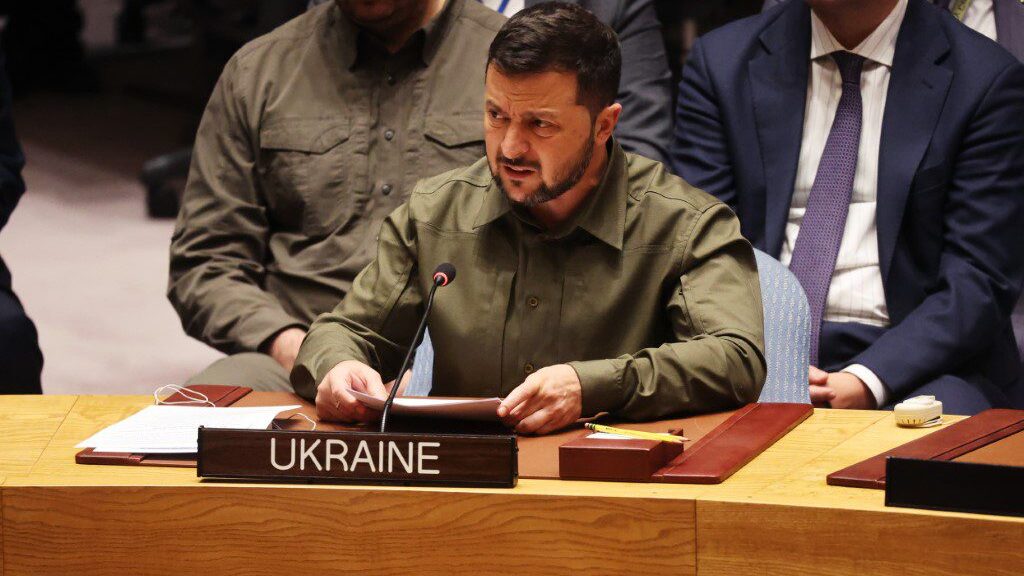Benjamin Netanyahu said the world needs more leaders like the Hungarian prime minister, while Javier Milei said Viktor Orbán has made Hungary a bastion of the Western world in a Europe that is being engulfed by darkness.

President of Ukraine Volodymyr Zelensky speaks to the U.N. Security Council on the war his country in a meeting during the United Nations General Assembly (UNGA) on September 20, 2023 in New York City.
Photo: SPENCER PLATT / GETTY IMAGES NORTH AMERICA / Getty Images via AFP
Ukrainian President Volodymyr Zelensky will meet his U.S. counterpart Joe Biden and U.S. Congressional leaders in Washington D.C. on Thursday, September 21st as he tries to shore up additional military backing from the United States. This will be Biden and Zelensky’s sixth in-person meeting, and the Ukrainian president’s second visit since his country was invaded by Russia nineteen months ago.
Joe Biden wants Congress to approve his request for $24 billion in additional spending for Ukraine, but as The European Conservative previously reported, Republicans are divided on the matter. In a letter to the Biden Administration, more than two dozen Republican lawmakers say they will oppose the president’s aid package.
In a sign of ever-increasing doubts about funding the war machine, Speaker of the Republican-majority House of Representatives Kevin McCarthy decided not to allow Zelensky to address the chamber as he did on his last visit to Capitol Hill last December.
“Look, what Russia has done— invade—is wrong. It’s an atrocity. We want to make sure that ends. I also have always said from the beginning, no matter what the issue is, I want accountability for whatever the hardworking taxpayers spend their money on, and I want a plan for victory,” McCarthy told reporters, reiterating Republican fears that funding sent to Ukraine is at times misused by corrupt officials. The U.S. has sent some $113 billion in security and humanitarian aid to help Zelensky’s government since Russia invaded.
McCarthy added:
Is Zelensky elected to Congress? Is he our president? I don’t have to commit anything. I have questions for him. Where’s the accountability on the money we’ve already spent? What is the plan for victory? I think that’s what the American public wants to know.
However, McCarthy will host Zelensky in a separate meeting at the Capitol, so too will Senate Majority Leader Charles Schumer of the Democratic Party.
The meetings come after Zelensky took the stage on Tuesday at the General Debate of the 78th Session of the UN General Assembly in New York, and attacked not only Russia, but also Central European nations that have blocked Ukrainian grain imports. In another sign of growing impatience with Ukraine, staunch ally Poland announced on Wednesday it will no longer arm Ukraine and instead focus on its own defence.
Zelensky also took the opportunity in New York to criticise the United Nations for a lack of reform since its establishment in 1945. Its most powerful body, the Security Council, is charged with ensuring international peace and security, but it has been blocked from taking any action on Ukraine because of Russia’s veto. The 15-member council’s five permanent members are nuclear powers China, France, Russia, the United Kingdom, and the United States, who can block any resolution. “All the UN actions—either by the Security Council or the General Assembly—that could have stopped this aggression, are shattered by the privilege granted by this seat to the aggressor. Veto power in the hands of the aggressor is what has pushed the UN into a dead end,”, Zelensky said in his speech to the UN Security Council on Wednesday.
The General Assembly has condemned Russia’s invasion and demanded the withdrawal of its forces and a reversal of its annexation of Ukrainian territory, but its resolutions are not legally binding. Zelensky therefore proposed that the General Assembly—where there are no vetoes—be allowed to suspend or strip the veto power of one of the five permanent members of the Security Council for egregious violations of the U.N. Charter.
Russian Foreign Minister Sergei Lavrov, showing up at the Security Council after Zelensky left, described Russia’s veto as a way to check Western power. He accused the West of “selectively” turning to UN norms and principles on a case-by-case basis “based on their parochial geopolitical needs”. Experts point out that—like Russia—the U.S. and the UK also intervened militarily in Iraq without the consent of the Security Council.
“The UN is powerless to address Russian aggression in Ukraine, in the same way it was powerless to address U.S. and UK aggression in Iraq. And yes, this seems to go against the initial purpose of the global body, which was created to save succeeding generations from the scourge of war, which twice in our lifetime has brought untold sorrow to mankind,” writes Tamsin Phillipa Paige, Senior Lecturer at Deakin University.
